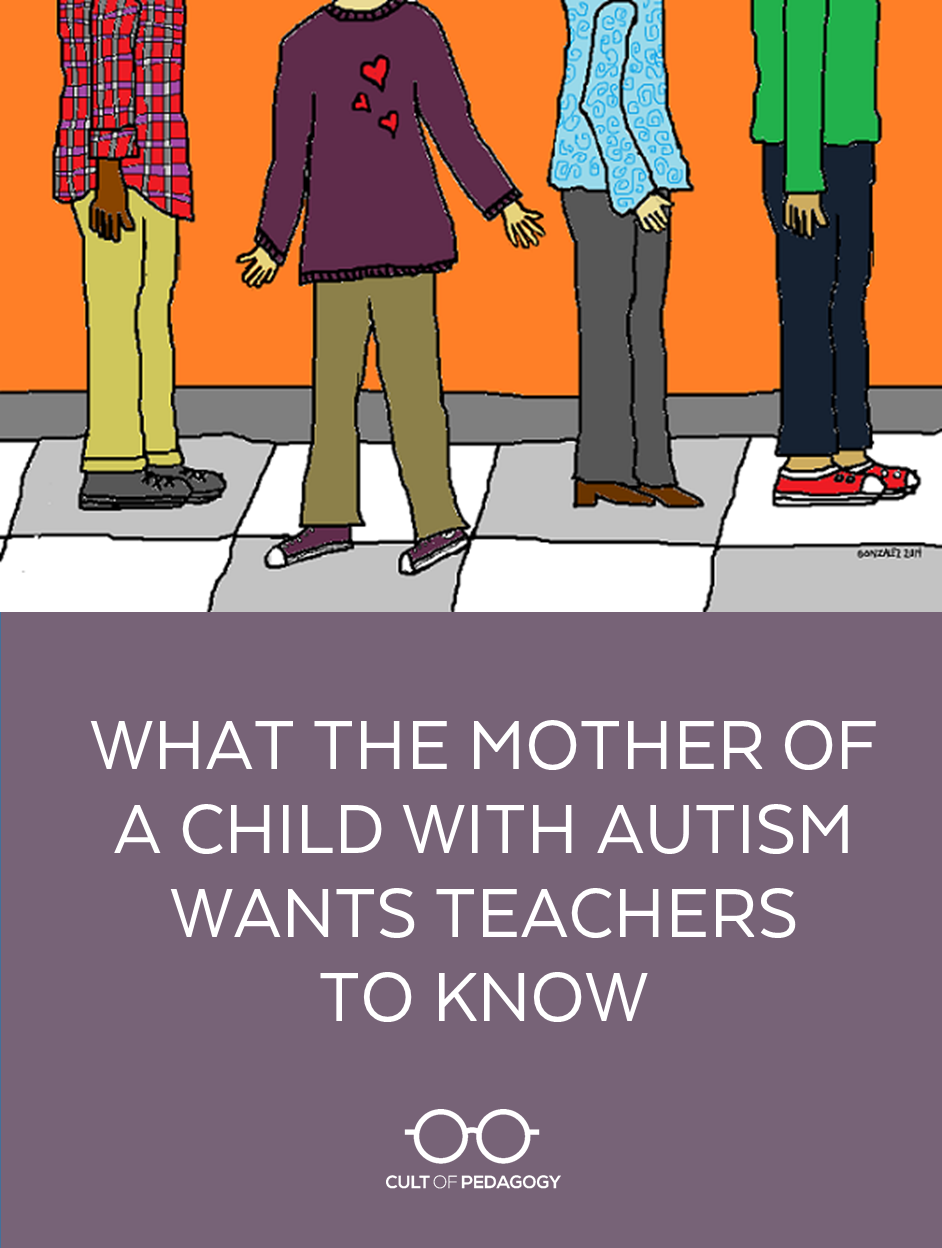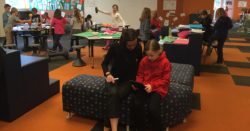
Listen to my interview with Leigh (transcript):
At first, my friend Leigh didn’t want me to air this episode. We recorded the interview and I sent her the finished version to see what she thought. I got a call the next day. “I’m so sorry to have wasted your time,” she said, “but my husband and I just listened and we realized that if our daughter ever heard it, she would die of embarrassment.” Though I understood her concern, I hated the fact that so many people would miss out on hearing the interview, because some of the things Leigh talked about really crushed my heart. Other teachers — other people need to hear this.
In the interview, Leigh talks about how she communicates with her child’s teachers, the steps she’s taking to improve her daughter’s social life, and the three things she wishes all teachers knew about kids with autism.
A few days after her phone call, I asked Leigh if she would be willing to have me air the episode with the names redacted and all other identifying information removed. She said yes, and I’m so glad, because now everyone will get the benefit of this honest, funny, moving interview. If you have ever had a child with autism child in your class, or if there’s a chance you ever will, set aside an hour to listen. ♦
Join our mailing list and get weekly tips, tools, and inspiration—in quick, bite-sized packages—all geared toward making your teaching more effective and fun. You’ll get access to our members-only library of free downloads, including 20 Ways to Cut Your Grading Time in Half the e-booklet that has helped thousands of teachers save time on grading. Come on in!!





Powerful Jennifer! Thanks Leigh for taking me to a deeper understanding.
I really appreciate this interview. And… as far as the friendships go… I don’t have any diagnosed level of autism (although sometimes I suspect)… I have always been shunned, even in adulthood. I don’t know what magical gift of friendship I don’t have, but I would at least like you to know that it’s not necessarily autism… kids are just mean. I was like that… all of my friends were adults, not children. I think it would be great if we taught these outsider children that they are OK to be outsiders… being told that having friends is what is normal sets it up as not having that is failure. I think finding the kids who can get along and grouping them is great… but wouldn’t it also be wonderful to be ok to sit alone? I’ve learned to appreciate that about myself as an adult and have found others like me that I can group with.
Please remember to use person first language. “A mother of a child with autism” is politically correct language.
Thanks!
Hi Dena,
Yes, we actually talked about this in the interview. I try to keep my titles as short as possible, and this one was already long as is, so I had to find some way to shorten it. I appreciate the heads up, though!
Hi, most autistic people prefer ‘autistic person’.
A lot of them (like me) don’t really mind either way. It’s not politically incorrect to say ‘autistic child’ and it’s the least of our worries!
Thanks for sharing this, Morgana!
As a parent of a child with autism, I love, love, loved this! You may have just as well been telling our story. So many similarities that as soon asLeigh started to cry, I did too. I know that pain oh so well, and Jennifer, you are so right that it helps to know you are not alone in the struggle. This also made me truly appreciate how fortunate we are to live in a county where almost everything on Leigh’s wish list of what schools/teachers can do to help have been implemented in my daughters’ schools…social skills groups, counselor-led education of the student body about autism, teacher-initiated meetings and/or questionnaires to get to know your child, etc. Also, we read the book The Reason I Jump together as a family and my daughter shared on a scale of 1-10 how closely each chapter described her personal experience so that we could better understand what it is like to live with autism. She truly loved that we did this because using his words finally gave her a voice she was unable to access on her own.
Hi Valerie,
It means so much to me that this post rang true for you. When Leigh initially decided she didn’t want me to air the episode, I was thinking specifically of other parents like you who would appreciate hearing her story, so to have you write in and let me know makes me really glad I was able to change her mind. I love your story about reading The Reason I Jump with your daughter. That’s pretty powerful. Thanks so much for taking the time to comment here.
My son was diagnosed with autism at Age 4 because of the late diagnosis he was not able to receive the preschool help he need it we live in a very small area with very very limited resources I am made to feel I am stuck the preschool teacher he should have seen he did for only 3 months she was amazing even gave suggestions to his special education teacher for kindergarten which we had to switch him to a different School the school board has set up one school Autistic Program only preschool but a different School Autistic Program only one Elementary School his kindergarten teacher was a nightmare she did not follow any of the suggestions from his preschool teacher never was an IEP meeting done correctly I have two children that needs an IEP my older son has apraxia and is in a regular system but has always had the meeting’s done correctly this special education teacher never once had my autistic son’s OT teacher speech teacher and never did any extra testing on him she did not seem to care even though she was in a classroom with 10 special needs children she was responsible for luckily this year she moved so he got a new teacher and is much better but I’m still made to feel I have no options we can’t afford outside help at age 6 we finally found a therapist that specializes in autism Behavior he diagnosed my son with Asperger’s but the school doesn’t care I feel they treat the autism children as just a nuisance just put them somewhere until the day is over so we can get the important stuff done it’s not right to be made to feel this way we’ve talked about moving 2 Massachusetts where I’m from and has a lot of resources but of course life gets in the way not sure if he is stimming I was told it was a tick it sounds like he’s constantly clearing his throat
Also in NC they have taken away extra funding for things like OT and Speech they requested us to give proof as to why my 2 children needed speech and one needed OT they basically said they aged out of the program and that they don’t need it anymore autism does not go away neither does apraxia
As she told her stories, I knew the answers, so similar was my experience as a mother trying to make the best use of public schools for my son who has high functioning autism as a diagnosis. In addition to the regular difficulties, he had a teacher who physically harmed him, covering him in purple bruises that I thought was grape jelly. His best teacher called him, “the professor” and gave him five minutes at the end of class every day to talk about anything he wanted to talk about, as long as he stayed on topic for the rest of the day. She reminded him to hold his thoughts until the end of the day and then gave him free reign. The other kids enjoyed it, he’s entertaining and informed on so many subjects.
He lacks sarcasm. I’ll never forget him telling me the teacher said it was raining cats and dogs so they couldn’t go out for recess. He ran to the window only to find it was just water. We found a book called “I have a frog in my throat and 101 other things that people say but don’t really mean.” It was very helpful. He was able to memorize some of the idioms people use in social speech.
I made myself accessible to the school in classrooms on a daily basis only to be ignored when my son was in crisis. I provided any material needed for modifications only to be told that he shouldn’t be treated differently. Until the fourth grade, I went into the classroom with a booklet written about a young boy with autism that described the typical behaviors, wanting to wear the same clothes, even if it was shorts in December, interrupting, focused attention on narrow subjects, sensitivity to classroom environment, lights, sounds, and other sensations. I encourage them to ask him or me questions about autism. It was my opinion that if the kids were informed they would be more sympathetic, observant and patient. It got to the point where I would walk up to pick him up for home and kids streaming out of the classroom would say, “Darby had a great day today!” Or “we had a substitute…” They gave me feedback that helped me know to when to let him decompress from a difficult day or reward him for being exceptional in someway, reinforcing positive behavior. It gave him friends. They showed an interest in him and in response he gave them the intense loyalty typical of friends with autism. I really identified with what she had to say about a truly inclusive classroom. In my experience it does help to be upfront about what makes all kids special, it might be an ability to sing, play football, ride a horse or in my son’s case, being smart and artistically talented and having a diagnosis of autism. It’s like saying you have curly hair, or you’re Italian – we were always that straightforward in our discussions about Darby’s diagnosis – of the positive aspects as well as the difficulties. I almost said, “weaknesses and “but we like to think of the characteristics as unusual rather than disabling or wrong.
There were some very common modifications we requested every year. My son didn’t get instructions emitted to the general air and so we asked that he be addressed specifically with instructions or the instructions be given to him in writing so that he excepted that they were meant for him and we knew he was paying attention. We asked the teachers not to be upset with his typical behaviors or omissions of behaviors. You wouldn’t believe how many teachers thought he could only learn if he was Gazing into her eyes, giving her eye contact common of NT-kids. We asked them to break down questions rather than bunching them where they could be easily overlooked. We asked them to note at the bottom of pages if the material continued on the backside. Sometimes our requests were welcome and other times we were told expected too much. After all, how could we expect the teacher to communicate clearly to my child?. I reminded teachers more than once that good communication skills would stand them in good stead anywhere – should they ever decide to do something else in life, that modifications made for Darby typically help all children and if they didn’t want to treat Him differently, the modifications would be wonderful for the other children, normal or not. Occasionally, in the face of reluctance or belligerence, I reminded a teacher that they wouldn’t expect a blind kid to see or a deaf kid to hear. Sometimes it didn’t seem fair but neither is going through life with all sensations coming at you at the same frequency either. Yes, we manipulated the situation to his benefit, but we never level.ed the playing field. Wouldn’t it be nice if these kids could manipulate the world around themselves? Parents are a necessary component in the education of kids on the spectrum, as advocates and a wellspring of tailored information for working in a situation where one size NEVER fits all.
We transferred to a magnet middle school that operated on a socially responsible model, where the kids were treated like any adult in a work environment. They called their teachers and the principal by their first names. When they complained about a rule they were encouraged to form a revolution and to establish their own rules based on the democracy they decided to adopt. They were encouraged to modify homework assignments if they were able to justify the value. They were allowed to request a day off from assignments if they had something going on at home. It was an amazing model – they even fed homeless people in the city park across the street. One day, disgusted by something, my son, in front of the entire class, called his teacher a douche bag. Of course, the teacher knew why Darby was upset, was amazed that he spoke out instead of shutting down, but still had to apply a punishment rather been isolating him from the behavioral expectations of the class. He called me to pick him up. My son thought it was great; he was on his way home, exactly where he wanted to be anyway. He thought he should probably call Frank a douche bag every day. I didn’t speak to him at all. I didn’t look angry. It looked like he was getting a free ride home. When I drove past our turn for home, he shouted a warning of a missed opportunity – delaying him needlessly. I told him we weren’t going home and pulled into the pharmacy parking lot. I walked in, picked up a douche, took it to the pharmacist and ask him to explain to my son in exact and precise detail, what it was and how it was used. In scientifically accurate terms, my son found out exactly why it was a term rarely used in anger and never in a classroom. On the way home I also explained to him how it was sexist, using a natural experience only known to women as an insult. Of course he was mortified. He wondered aloud if Frank was still there and if we could go back to school so he could apologize immediately. Instead, I had him spend the afternoon writing a detailed letter about what he learned, not to use a word he didn’t know – ever, how very sorry he was.
My son is in college now. He will be finishing up an AS degree with a certificate in Orthotics and Prosthetics. He plans to go on to receive and Engineering degree and a MD degree. He wants to design bionic prosthetics, especially for wounded warriors. He will probably appear to be more and more normal thinking as he progresses in his educational pursuits, ironically. I’m grateful for the experience of being his mother. I wouldn’t train him to be normal, nor would I trade him for Any NT kid. I’m not even sure I would wish for a cure, so singularly interesting is his outlook. I would give anything for him to be happy in relationships, with friends, lovers, spouses, children, all the relationships a mother dreams of for her children. Yep, here we are – still working to find modifications that work for our son.
Loved, loved this program.
I acknowledge fully the use of, “talk to text”. I notice now, numerous translation errors and frequent tense shifts. I’m sorry and I’m not sorry. I wish my comments were better written but I’m glad to find kindred spirits & I was passionately inspired by your program.
I cried right along with her on many topics, my TJ was diagnosed just last year, he started pre k, a few months later….I have one question….does she or any parents always go with their gut feeling in the care that is needed for their child. I only ask as I am feeling the yurning that more could be done for him, I feel as if I’m taking that extra step as she spoke about, and not getting the desired results with some of the staff at the school, and even with some of the medical standpoint as well….I try to calm my nerves on some of these aspects, but have read in many places that getting the help he needs early on is key.
I am slowly working through the podcasts (hoping I can finish before school starts again!) this summer and just finished your interview with Leigh. While I have been touched, inspired, motivated and challenged by much of what I’ve read on your site, this interview actually brought me to tears. The fact that it was more of a conversation between friends was beautiful. I am a middle school Special Education teacher and, while I do have relationships with many parents, Leigh’s experience and perspective gave me pause. I’m already compiling a list of what I want to do differently this year, just based on Leigh’s comments. I was particularly struck by the conversation about modifications. In our county we refer to any changed curriculum as reformatting. I am in a constant state of educating general educators about what reformatting really means (not simply using the black Sharpie to darker two of the multiple choice answers). Perhaps it’s fodder for another podcast?!
Thanks to Leigh for her candor and willingness to advocate so strongly for her daughter and all of the other students in her daughter’s class. The world needs more parents like her!
Gabrielle, thank you so much for taking the time to share your thoughts here. This episode is still one of my favorites, because I felt like we got into some really important stuff that doesn’t get talked about enough. I am so grateful to Leigh for her willingness to have her story shared.
I’m not sure if you’ve gotten to episode 56 yet, but I’m thinking you will love my interview with special educator Jam Gamble as well. Thank you again!
I’m a substitute teacher and I’m one of few in my district willing to sub special ed classes. The district is always so thankful to me whenever I pick up a special ed class. I love working with the kids but it does seem very unfair to them to have someone as inexperienced as I am in there with them, even if it’s only for one day. I am kind to them and talk to them as I would other children, but as I pick up more subbing work I definitely think I need to spend some time reading about the different populations of kids I’ll encounter. This podcast was so enlightening; thank you so much!
Jennifer, i just discovered your website. I LOVE it! I have two autistic children and to hear this interview made my day. Here, in The Netherlands, we struggled a lot with the school they were going to.
Besides this, i worked for 13 years in Art Education and now i found a new challenge at a middle school’s library. Your articles about.. well.. ALL your articles are inspiring and helping me to find new ways in what i want to chance/innovate to help children learn.
Thank you!
Please let people know this is high functioning autism. My son also has autism. He will never mainstream. He has the autism people don’t talk or write about. It is crushing to know people will get bits and pieces from this and assume most or many people with autism are the same.
Just a note – this is a great interview and has great insight.
I just have just a little quibble. Special Education teachers are very, very
educated regarding accommodations and modifications. We do not just study the laws and paperwork. Accommodations and modifications are almost the most important things that we can do.
This conversation was amazingly helpful and very moving.
A 1000 thank yous to Jennifer and Leigh.
Your article, written from the perspective of a mother with an autistic child, provides valuable insights and advice for teachers working with autistic students. By sharing personal experiences and perspectives, you offer educators a deeper understanding of the needs and strengths of autistic students in the classroom. The emphasis on communication, individualized support, and fostering a positive and inclusive environment underscores the importance of creating an inclusive educational experience for all students. Thank you for sharing this heartfelt and informative piece that can enhance the understanding and support of autistic students in educational settings. Well done on advocating for better understanding and collaboration between parents, teachers, and autistic students!
Glad you found the episode valuable, Darrell!